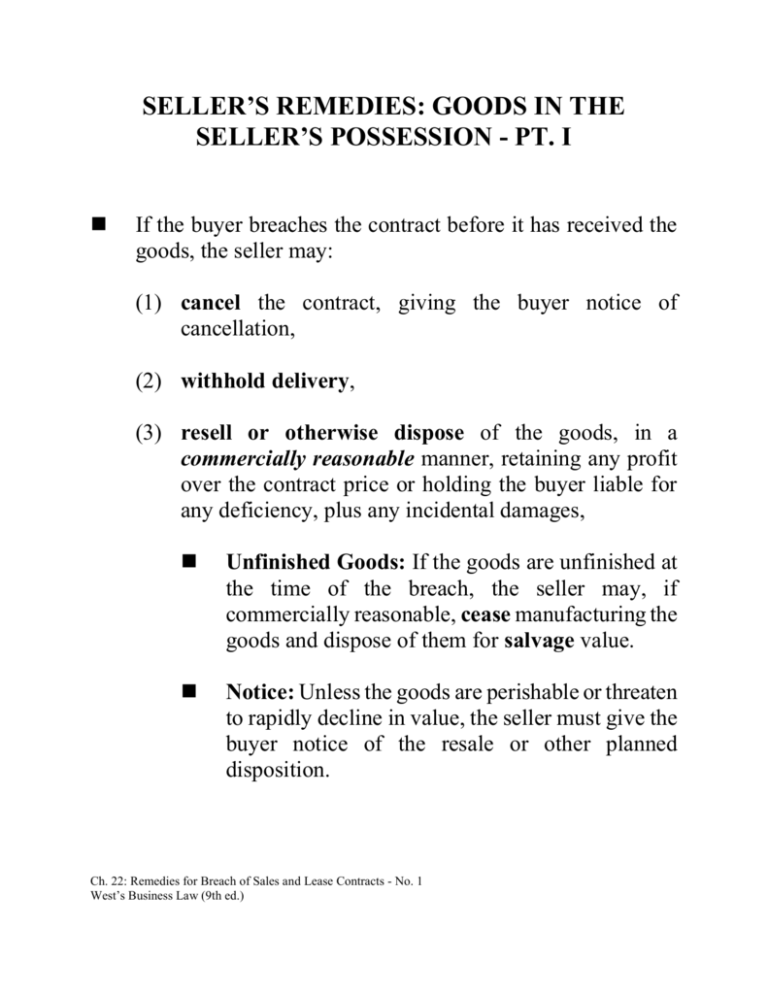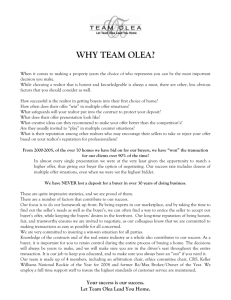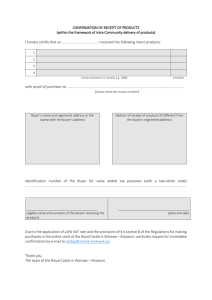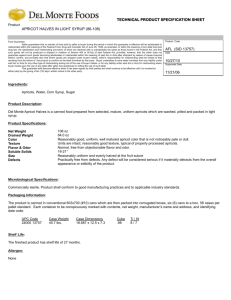SELLER`S REMEDIES
advertisement

SELLER’S REMEDIES: GOODS IN THE SELLER’S POSSESSION - PT. I If the buyer breaches the contract before it has received the goods, the seller may: (1) cancel the contract, giving the buyer notice of cancellation, (2) withhold delivery, (3) resell or otherwise dispose of the goods, in a commercially reasonable manner, retaining any profit over the contract price or holding the buyer liable for any deficiency, plus any incidental damages, Unfinished Goods: If the goods are unfinished at the time of the breach, the seller may, if commercially reasonable, cease manufacturing the goods and dispose of them for salvage value. Notice: Unless the goods are perishable or threaten to rapidly decline in value, the seller must give the buyer notice of the resale or other planned disposition. Ch. 22: Remedies for Breach of Sales and Lease Contracts - No. 1 West’s Business Law (9th ed.) SELLER’S REMEDIES: GOODS IN THE SELLER’S POSSESSION - PT. II (4) if the seller is unable to dispose of the goods in a commercially reasonable manner, sue to recover the purchase price or payments due, plus incidental damages, or (5) sue to recover as damages (a) the difference between the contract price and the fair market price of the goods (at the time and place of tender), plus incidental damages, or (b) the seller’s lost profits, including a reasonable allowance for overhead and other expenses. A seller can only recover lost profits if recovering the difference between the contract price and the market price at the time and place of tender will not place her in the same position she would have been in had the buyer performed. Ch. 22: Remedies for Breach of Sales and Lease Contracts - No. 2 West’s Business Law (9th ed.) SELLER’S REMEDIES: GOODS IN TRANSIT If the seller has delivered the goods to a carrier or bailee, but the buyer has not yet received them, the seller may: (1) if the buyer is insolvent, stop the carrier or bailee from delivering the goods to the buyer, or (2) if the buyer has breached the contract but is not insolvent, stop the carrier or bailee from delivering the goods only if the quantity shipped is at least a carload, truckload, planeload, or a larger shipment. In order to stop delivery, the seller must timely notify the carrier or bailee. The seller will bear any costs of holding or returning goods in transit. The seller’s right to stop delivery expires if: (a) the buyer obtains possession of the goods; (b) the carrier or bailee acknowledges the buyer’s right to possession; or (c) the buyer possesses the document of title. Ch. 22: Remedies for Breach of Sales and Lease Contracts - No. 3 West’s Business Law (9th ed.) SELLER’S REMEDIES: GOODS IN THE BUYER’S POSSESSION When a buyer breaches a contract after receiving the goods, the seller may: (1) if the buyer refuses to pay, sue for the purchase price or payments due, plus incidental damages; or (2) if the buyer is insolvent, reclaim any goods sold on credit (a) within 10 days of the buyer’s receipt, or (b) at any time if the buyer misrepresented her solvency in writing within 3 months prior to the delivery of the goods. If the seller elects to reclaim, she will be barred from seeking any other remedy, such as incidental damages. Ch. 22: Remedies for Breach of Sales and Lease Contracts - No. 4 West’s Business Law (9th ed.) BUYER’S REMEDIES: NONDELIVERY - PT. I If the seller refuses to deliver the goods to the buyer, the buyer may (1) cancel the contract, relieving the buyer of any further obligations under the contract, while retaining all rights against the seller, (2) if she has made partial or full payment for identified goods in the possession of an insolvent seller, recover the goods by tendering to the seller any remaining balance of the contract price, (3) if the goods are unique and any legal remedy will be inadequate, require the seller to specifically perform the contract by tendering the identified goods to the buyer, (4) in good faith and without unreasonable delay, purchase or lease substitute goods (a.k.a. cover) from a third party, and sue to recover from the seller any difference between the contract price and the price of the replacement goods, plus any incidental and consequential damages, less any costs saved by the breach, Ch. 22: Remedies for Breach of Sales and Lease Contracts - No. 5 West’s Business Law (9th ed.) BUYER’S REMEDIES: NONDELIVERY - PT. II (5) if the buyer can show that she is unable, after a reasonable effort, to obtain cover for the contract goods, replevy (i.e., take or demand possession of) goods subject to the contract, or (6) sue to recover the difference between the contract price and the fair market price of the goods (at the time that the buyer learned of the breach), plus incidental and consequential damages, less any costs saved. Ch. 22: Remedies for Breach of Sales and Lease Contracts - No. 6 West’s Business Law (9th ed.) BUYER’S REMEDIES: NONCONFORMING GOODS - PT. I When the seller delivers nonconforming goods or makes a nonconforming tender, the buyer, following reasonable notice to the seller of the defects in the goods or the tender, may (1) within a reasonable period of time after delivery, reject the goods, provided that (a) if the rejecting buyer is a merchant, and (b) the seller has no agent or business at the place of rejection, (i) the buyer must follow any reasonable instructions from the seller regarding the goods; or, lacking instructions (ii) the buyer may resell the goods in good faith or store the goods if they are nonperishable. Ch. 22: Remedies for Breach of Sales and Lease Contracts - No. 7 West’s Business Law (9th ed.) BUYER’S REMEDIES: NONCONFORMING GOODS - PT. II (2) within a reasonable period of time after the buyer discovers or should have discovered a nonconformity that substantially impairs the value of the goods to her, revoke her acceptance of the goods, as long as she (a) did not discover the nonconformity prior to acceptance, either because it was not apparent or because assurances from the seller kept the buyer from inspecting the goods, or (b) accepted the goods on the reasonable assumption that any nonconformity would be cured and its has not been cured within a reasonable time, or (3) keep the goods and sue for the difference between the value of the goods as accepted and their value as promised in the contract. Ch. 22: Remedies for Breach of Sales and Lease Contracts - No. 8 West’s Business Law (9th ed.) LIMITATIONS ON REMEDIES Contractual Limitations on Remedies: The parties may contractually agree to expand or limit the remedies provided by the UCC. The parties may also limit or exclude consequential damages as long as the limitation or exclusion is not unconscionable, given the relative bargaining strength of the parties. Statute of Limitations: An action for breach of contract under the UCC must be commenced within four years after the injured party knew or should have known of the breach. The parties may contractually agree to reduce this period to not less than one year, but may not extend it beyond four years. A buyer who accepts nonconforming goods must notify the breaching party of the breach within a reasonable time to permit the breaching party to cure; the buyer’s failure to do so will bar any claim for breach. Ch. 22: Remedies for Breach of Sales and Lease Contracts - No. 9 West’s Business Law (9th ed.) REMEDIES FOR BREACH OF INTERNATIONAL CONTRACTS CISG remedies are very similar to those provided by Article 2 of the UCC. Namely: Article 74 of the CISG provides for money damages, including foreseeable consequential damages. Article 49 permits a buyer to avoid obligations under the contract if the seller breaches the contract or fails to perform within the agreed time. Likewise, Article 64 permits a seller to avoid obligations under the contract if the buyer breaches the contract, fails to accept performance within the agreed time or fails to pay for the seller’s goods. Article 28 permits specific performance, but only if the court in which a party seeks specific performance under the CISG could grant specific performance under its own laws. Ch. 22: Remedies for Breach of Sales and Lease Contracts - No. 10 West’s Business Law (9th ed.)






